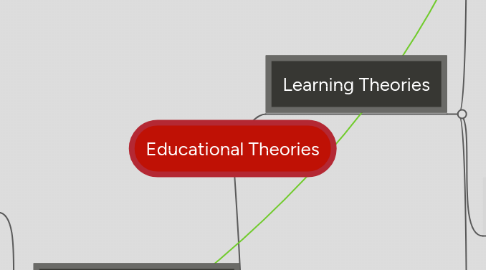
1. Technology Theories
1.1. Media Ecology
1.1.1. Technology Influences Soiety
1.1.2. "Medium is the Message"
1.1.2.1. What we use to convey information is important
1.1.3. Currently in the "digital era"
1.1.4. Media Involvement
1.1.4.1. Hot
1.1.4.2. Cool
1.2. Social Construction of Technology
1.2.1. Influences on Technology
1.2.1.1. Society Action
1.2.1.2. Human Action
1.2.2. Symmetry
1.2.2.1. New node
1.2.3. Closure
1.2.3.1. Rhetorical Closure
1.2.3.2. Redefinition of the Problem
2. Learning Theories
2.1. Cognitive Load Theory
2.1.1. Working Memory
2.1.1.1. Reasoning
2.1.1.2. Comprehension
2.1.1.3. Available
2.1.2. Meaningful Learning = Run Smoothly
2.1.3. Chunking
2.1.4. Learning Structures
2.1.5. Instructional Design
2.1.6. Means-Ends Analysis
2.1.7. Load
2.1.7.1. Intrinsic
2.1.7.2. Extraneous
2.1.7.3. Germane
2.1.7.4. Over Load
2.1.7.5. Under Load
2.1.8. Error
2.1.8.1. Fundamental Attribution Error
2.1.9. "The Mind is a Computer"
2.1.10. Educational Implications
2.1.10.1. Teachers need to present information in a logical manner
2.1.10.2. Teachers need to find ways to connect information to students memory
2.1.10.3. Teachers need to make information easy to decipher and follow (user friendly)
2.1.10.4. Teachers need to present information in ways that lower student stress
2.2. Constructivist Theory
2.2.1. Rhizome (network)
2.2.2. Connections
2.2.2.1. With Environment
2.2.2.2. Complex --> Basic
2.2.2.3. Knowledge from Experience
2.2.3. Perceptions
2.2.3.1. Prior Experience
2.2.3.2. Mental Structures
2.2.3.3. Beliefs
2.2.4. Problem-Based Learning
2.2.5. Project-Based Learning
2.2.6. Authentic Tasks
2.2.7. Discovery Learning
2.2.8. Case-Based Learning
2.2.9. Collaborative Learning
2.2.10. Active Learning
2.2.11. Vygotzky
2.2.11.1. Zone of Proximal Development
2.2.12. "Learning by Making"
2.2.13. Educational Implications
2.2.13.1. Teachers need to be able to facilitate their students learning
2.2.13.2. Teachers need to know their students and how to build their knowledge on what is already known
2.2.13.3. Teachers need to be open to different perspectives and worldviews
2.2.13.4. Teachers need to provide collaborative and realistic learning environments
2.3. Connectivist Theory
2.3.1. Connections (of specialized nodes)
2.3.1.1. Nurtured and maintained to facilitate continual learning
2.3.1.2. Between fields, ideas, and concepts
2.3.2. Developing a Network
2.3.2.1. Set of connected nodes
2.3.3. "Digital Age"
2.3.4. Knowledge = set of connections formed by actions and experience
2.3.5. Diversity of opinion
2.3.6. Capacity to know > Current knowledge
2.3.7. Currency (knowledge)
2.3.7.1. Accurate
2.3.7.2. Up-to-date
2.3.8. Decision Making
2.3.9. Educational Implications
2.3.9.1. Teachers need to teach students how to find information
2.3.9.2. Teachers need to network and provide resources for students to network
2.3.9.3. Teachers need to provide collaborative and social work environments
